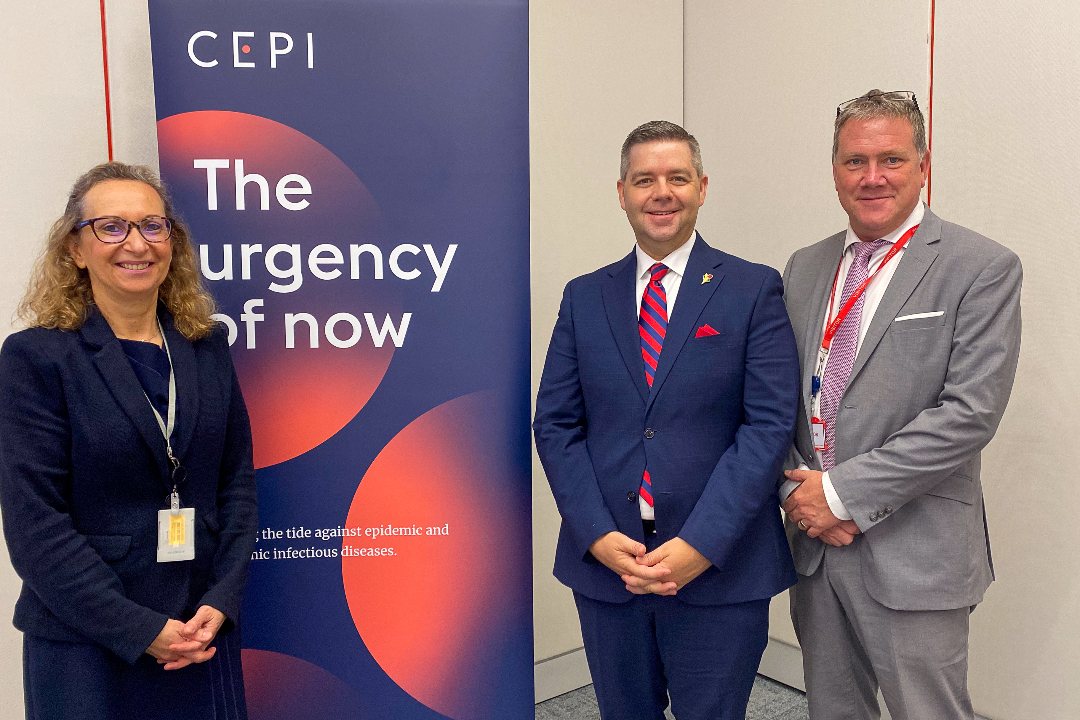
USask’s VIDO selected for CEPI’s international research network
The University of Saskatchewan’s (USask) Vaccine and Infectious Disease Organization (VIDO) has signed an agreement today to join the Coalition for Epidemic Preparedness Innovations’ (CEPI) preclinical research network. VIDO is the only organization in Canada and the ninth in the world selected for this research network to date.
CEPI is a leading global partnership launched in 2017 with the mission to accelerate the development of vaccines and other countermeasures against epidemic and pandemic threats so they can be accessible to all people in need. CEPI’s global membership includes public, private, philanthropic, and civil society organizations. The Government of Canada provides financial support to CEPI.
The agreement establishes a formal partnership between the two organizations for preclinical research model development and testing innovations for human health. Saskatchewan Minister Responsible for Innovation Saskatchewan, Jeremy Harrison, was on hand in London, U.K., to participate in the signing ceremony with CEPI’s Executive Director of Vaccine Research and Development, Melanie Saville, and VIDO’s Director, Dr. Volker Gerdts. VIDO receives operating support from Innovation Saskatchewan.
This network is an important part of CEPI’s pandemic preparedness plan which aims to accelerate the development of vaccines against priority pathogens with epidemic or pandemic potential—including “Disease X” or a pathogen currently unknown to cause human disease—in pursuit of the 100 Days Mission. Backed by Canada and other members of the G7 and G20, the 100 Days Mission aims to compress the time taken to develop safe, effective, globally accessible vaccines against emerging disease outbreaks to within 100 days.
CEPI-supported vaccine developers can access this research network to advance preclinical testing of their vaccine candidates, with the data from such trials informing the developer as to whether the candidate can move into clinical testing. Regulatory approval of these vaccines will rely on the preclinical efficacy studies conducted in high containment facilities, such as VIDO.
VIDO was selected as part of CEPI’s network based on their scientific excellence, their robust quality systems, and their strong ethical research practices. Today’s agreement further builds on a collaboration started in 2021 with CEPI providing up to $6 million (CAD) award to VIDO for vaccine development. It was CEPI’s first ever award to a Canadian university as part of a $200-million program to advance the development of vaccines that provide broad protection against COVID-19 variants and other coronaviruses.
This announcement aligns with VIDO’s strategic efforts to increase its global presence as part of its mission to protect the world from infectious diseases.
Quotes
“I am delighted to expand our partnership with VIDO and the University of Saskatchewan as we better prepare the world for future epidemics and pandemics. Faster vaccine candidate data readouts, supported by our preclinical model network, could give the world a head start in generating evidence on potential vaccine candidates to drive forward the 100 Days Mission. If the world can achieve this, we could prevent a future emerging infectious disease outbreak turning into another COVID-19-like scenario.”
-
Dr. Melanie Saville, Executive Director of Vaccine Research & Development, CEPI
“Today’s signing with CEPI demonstrates the growing influence of Saskatchewan around the world. The leadership of VIDO, and its expanding list of world-class international partners are making a difference to the health of the world.”
-
Jeremy Harrison, Minister Responsible for Innovation Saskatchewan, Government of Saskatchewan
“USask is committed to collaboratively advancing our vaccine research. We are thrilled that our state-of-the-art facilities and innovative researchers at VIDO can work with CEPI in developing effective solutions for international health-related issues such as infectious disease.”
- Dr. Baljit Singh, Vice-President Research, University of Saskatchewan
“Developing solutions to high consequence pathogens requires a coordinated international effort. VIDO is proud to continue our work with CEPI and provide our disease modelling expertise and world-class facilities to this network.”
-
Dr. Volker Gerdts, Director and CEO, VIDO
CEPI’s Preclinical Model Network
CEPI has established a network of high containment laboratories (BSL-3 and -4) for testing of vaccines against their priority pathogens in preclinical models. The laboratory partners have been selected based on their scientific excellence in biocontainment work and innovations, their robust quality systems for data collection, and their strong ethical research practices. To date, CEPI have established partnership agreements with UK Health Security Agency (formerly Public Health England), UK Medicines and Healthcare products Regulatory Agency (formerly National Institute of Biological Standards and Control), Defence Science Technology Laboratory, Wageningen Bioveterinary Research, University of Pittsburgh, University of Texas Medical Branch, National Emerging Infectious Diseases Laboratory, and Commonwealth Scientific and Industrial Research Organisation.
CEPI commissions the laboratories to establish preclinical models of infection/disease. These preclinical models are made available to CEPI-supported vaccine developers to test their vaccine candidates. This will allow vaccine developers to have their candidates rapidly assessed. It also allows CEPI and potential future vaccine regulators to be sure that the vaccine has been assessed in its early stages under rigorous quality standards.
The majority of the work by CEPI’s network has to date focused on preclinical models for COVID-19, but has also commissioned work on Nipah, Lassa fever, and Chikungunya, and will look to start work on MERS, and Rift Valley fever preclinical models in the near future.
Together, we will undertake the research the world needs. We invite you to join by supporting critical research at USask.

